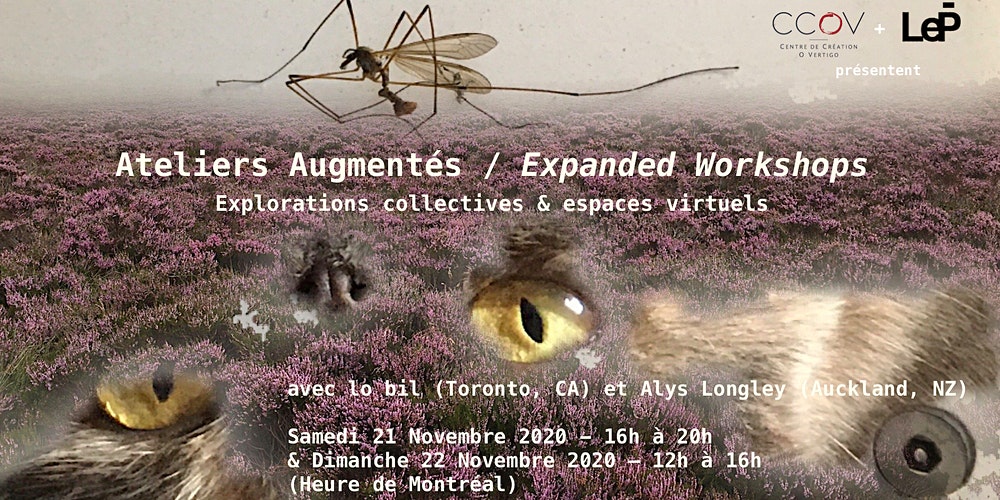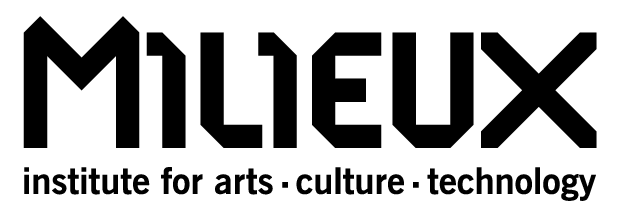
- This event has passed.
Expanded Workshops: Bodies in virtual space
2020-11-21 - 2020-11-22

Expanded Workshops is a new curated series at the Centre de Création O Vertigo (CCOV), in partnership with LePARC.
These two experimental workshops will focus on collaboration, co-creation and touch, and on roughening the protocol for bodies coming together in virtual spaces.
You can take part in these two workshops in any space that seems most appropriate to your practices, desires and comfort-level. There are 9 spaces available in the CCOV studio. In order to respect the sanitary precautions of the CCOV, each space is separated by 2m, and will be reserved on a first come first served basis. Others may join via Zoom from anywhere that suits you.
Nov. 21: Language is an intangible bridge
4 to 8 p.m. ET
French, English and Spanish
Requirements: Please collect cardboard of different sizes, craft knives, scissors, drawing materials, paper and any other craft and art materials that you desire. Be prepared to send digital images and video to a shared file during the session. We are aiming to co-create an artist-book in the real time of the workshop with documentation contributed by attendees.
An artistic experiment in collaboration, co-creation and touch
Led by Alys Longley (NZ), Macarena Campbell, Máximo Corvalán-Pincheira, Eduardo Cerón-Tilleria, Rolando Sanhueza (Chile), and pavleheidler (Sweden).
This lecture-workshop presents an experiment in collaboration across distance and time zones. It tests working methods for the Cartón/ Cardboard project (led by Macarena Campbell and Alys Longley), with artists in Auckland, NZ, Santiago, Chile and Stockholm, Sweden) in which we work with cardboard as an equalizing and accessible skin.
In this way, artists in different continents share the same experiments in touch and collaboration from geographically separated terrains. We will work with scores, instructions, poetics, experimental documentation, creating performance materials and expanded fields of choreography and writing. This project is inflected by the geopolitics of the Global South.
Nov. 22: Human-Human: trialling ecologies of practice
Noon to 4 p.m. ET
English
Requirements: none
lo bil will facilitate Human-Human live from Toronto, CA. lo bil invites us to roughen the protocol for bodies coming together in virtual spaces. She proposes the screen as an ocean, a barrier that is not inherently hostile but that has gravity and pull. Screens, made of glass, are more liquid than solid, simultaneously an object and an interlocutor.
How can we reinvent our codes and body camera? How to reposition ourselves to open up vulnerability under the omnipresent dynamic of surveillance?
lo’s practice of ‘moving weirdly’ and ‘post-clown’ (what’s next? lol) – a winking half joke, a hazy embrace of the confusing liminal landscapes we have wandered into, unnavigable with preparation or compass.
“I’m borrowing from the self-sourcing Pochinko training without adhering to the outcomes of the clown genre. I’m beginning with the minimum of the body in an environment, being in the discomfort of not knowing, feeling the emergency, breathing the body response through the eyes, how to outwit oneself when we are collectively enmeshed in a system of violence, staying with the problem, generating and riding energetic waves, acknowledging the psychic space between subject and witness as the primary compositional movement, how to acknowledge that all things are alive on the microbial level.”
lo’s performances involve body-based experiments to generate intuitive “felt” research into academic concepts and unique responsive behaviours through spontaneous utterance, impulse-based scores, object manipulation, unexpected humour and inter-relational proposals with audiences. She describes her performance actions as ‘anti-objective,’ meaning not working toward an expected outcome, but rather aiming toward discovery-based ‘non-repeatable’ actions.
